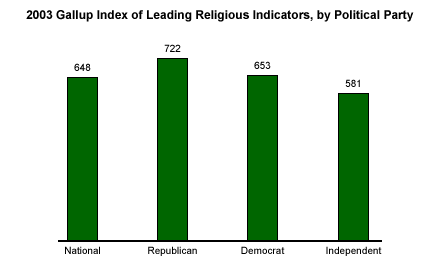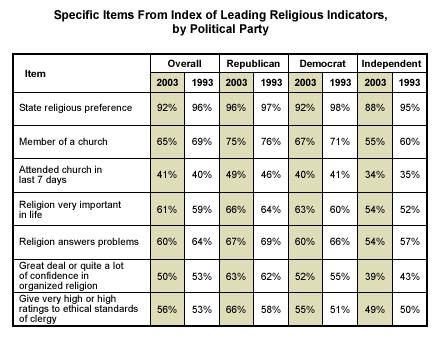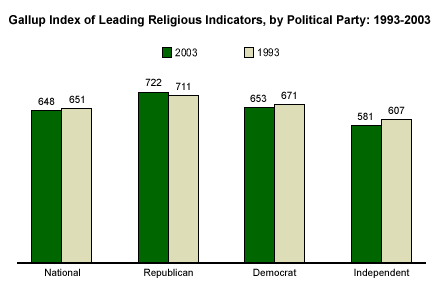About 6 in 10 Americans say religion is very important in their lives; thus, it would be foolish to think that faith has no influence in the voting booth on Election Day. In fact, 64% of registered voters say that their personal religious beliefs and faith will be important in deciding their votes for president this year. Because Americans' faith will likely affect the political process this fall to some degree, it is interesting to examine self-reported levels of religiosity among Republicans, Democrats, and independents.
Gallup's Index of Leading Religious Indicators*, which measures levels of religiosity in the United States on an annual basis, is a compilation of Americans' responses to a series of Gallup questions about religious beliefs and practices. The 2003 Index shows rather large differences by party affiliation. With an average score of 722 out of a possible 1,000, Republicans, as a group, are more religious than Democrats are (653), but independents (581) are the least religious group.

Democrats and Republicans
Democrats' average score on the Index is 69 points lower than that of Republicans. That this gap is not larger is somewhat surprising, because ideologically liberal Americans -- one of the least religious groups in the United States -- tend to align themselves with the Democratic Party.
Not only do Republicans score most highly on the Index overall, but their average ratings on every individual item are also higher than those of their Democratic or independent counterparts. These findings are generally consistent with what Gallup has observed in previous years, including 1993.

However, most of the gaps between Democrats and Republicans are fairly modest. Democrats score 10 points or more below Republicans on only two of the individual question items that make up the Index -- confidence in organized religion and ethical ratings of the clergy. On one extremely important marker -- "How important would you say religion is in your own life?" -- Democrats are almost as likely as Republicans to say "very" important (63% vs. 66%, respectively).
Independents
Independents score significantly below both Republicans and Democrats on the composite Index. Furthermore, they score lower on all of the individual items than do Republicans or Democrats. They are significantly less likely than Republicans or Democrats to belong to a church or synagogue or to have attended church in the last seven days. Just over half (54%) of independents tell Gallup that religion is very important in their lives. Independents also have dramatically less confidence in organized religion (39% have "a great deal" or "quite a lot" of confidence) than do Republicans (63%) or Democrats (52%).
It's possible that both the reluctance to adhere to specific religious ideas and behaviors and the reluctance to align oneself with an established political party both tend to spring from an unwillingness to commit oneself to a set of prescribed beliefs. Regardless of the reason, the data clearly indicate that independent voters make less of a commitment to religion than do Republicans or Democrats.
Religiosity Shifts in the Past Decade
Although the national figure for religiosity has changed little over the past decade, a closer look at the data suggests a widening of the gaps among Republicans, Democrats, and independents. Republicans have gained 11 points on the Index in the last 10 years, while Democrats and independents now have lower levels of religiosity than they did in 1993 -- 18 points less for Democrats and 26 points less for independents. However, the relative positions of all three groups have remained the same, with Republicans having the highest level of religiosity, and independents the lowest level.

The stability in the overall Index is attributable to two factors. One, the declines in religiosity for independents and Democrats are offset to some degree by the increase for Republicans. While the Republican gains are not enough to offset the declines of the other groups totally, there are more Americans identifying themselves as Republicans today than there were 10 years ago.
*The 2003 Religion Index was compiled from surveys of national adults, aged 18 and older, conducted throughout the year.
